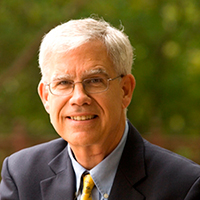Group of four business leaders discussion strategy in an office.
The next ten years will be radically different than the last with exponential change occurring in technology, globalization, and the environment. Technology will have a significant impact on the nature of work and employment. Complex global supply chains will dictate where value is added, profits accrue, and wealth is distributed. Environmental changes will intensify economic and social impacts. All three trends will create disruption as well as opportunities for innovation.
What must business leaders do to navigate these accelerating changes?
They must integrate critical thinking into decision making.
Baker College DBA graduate Timothy Scheid described how challenges facing today’s decision makers require the integration of critical thinking with executive decision making. In his dissertation, entitled Integrating a Formalized Critical Thinking Model with Executive Decision Making, he described critical thinking as a formal process not a personal attribute. Everyone imagines him or herself as thinking critically, but few reflect before acting, examine his or her underlying assumptions, remain open to others’ thoughts, or gain as complete a picture as possible before taking action.
As the pace of change increases exponentially and with cognitive and data analytic functions being outsourced to computers, the temptation is to skip these key steps in the critical thinking process. Separating signal from noise, fact from opinion, and assertion from argument is more important than ever. Formal education, therefore, with its emphasis on critical thinking has a role to play. For that reason among others, a close collaboration between scholar and practitioner is essential in the digital age.
They must innovate.
Formal education is also important as a catalyst for innovation and entrepreneurship as another Baker College DBA graduate has found. Ralph Griffith’s dissertation entitled The Factors that Influence an Entrepreneur’s Decision to Seek Formal Education concluded that “Tailoring entrepreneurship curricula to traditional disciplines is ineffective. Close relationships need to be developed with industry experts, advisory boards, and alumni in order to understand the needs of entrepreneurs in a dynamic business environment and to change curricula to reflect the market.” His research on entrepreneurship led to his appointment as Assistant Prof. of Entrepreneurship at Lenoir-Rhyne University.
Since joining the University, he has developed two new majors (Entrepreneurship and Social Entrepreneurship) and founded the Center for Commercial and Social Entrepreneurship (CCSE) and an on-campus business incubator, Innov828, which commercialized six products and two patents in the last year. He has also taught at different universities through a unique entrepreneurship program called Summerfuel. This program takes the brightest students from around the world and places them at a new university each year for 5 weeks of instruction.
The last three years he has had the experience of teaching at Yale University in the famous Harkness Hall, Stanford University, and this past year at Oxford University in the UK. Ralph is currently a finalist for a Fulbright fellowship to Germany. His work demonstrates that business education can catalyze innovation. Business educators must partner with business leaders to innovate.
They must co-create knowledge.
Exponential change places a special burden on business education and makes it all the more important that a close collaboration occur between academics and practitioners. David Gomez, for example, while a student and a senior manager at an airline hub applied knowledge gained in his BUS 8130 Quality Improvement and Organizational Change class to move the ranking of the airline from fourth to first in how baggage was handled as measured by the Department of Transportation. Turnaround time at airports is a critical metric for airlines and can lead to significant fines if not properly handled.
Academics need to value the contributions that practitioners make in identifying and solving problems and adding to our understanding and practitioners need to see how theory can inform action.
The Baker College DBA program can play an important role in preparing agile and resilient business leaders for the coming decade. With its support for reflective practice and critical thinking, its pedagogy of learner-centered instruction, collaboration, and engagement, and its support for applied research and lifelong learning, Baker’s DBA program is well positioned to prepare leaders for the exponential change that lies ahead.



